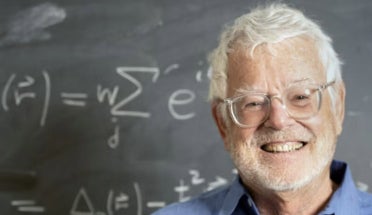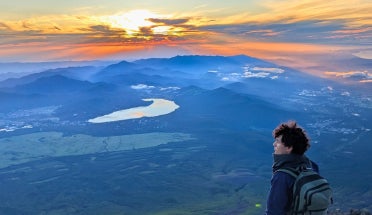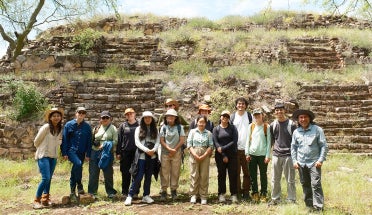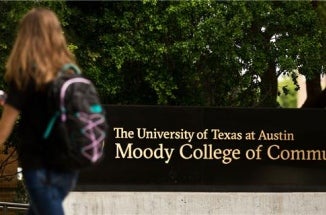
Center for Global Change and Media Champions International Collaboration
- Jul 1, 2025
- by Alex Briseño
At the Center for Global Change and Media at the Moody College of Communication, a bold vision is taking shape.
“At the Center for Global Change and Media, one of our mottos is, ‘When we transform media, we transform societies,’ ” said founding director Celeste González de Bustamante. “That’s what we’re working to do.”
This guiding belief has quickly established the center as an international research hub that addresses some of the most urgent issues facing an ever-evolving media landscape and explores our role in guiding its future.
Bustamante’s vision for the center was clear upon its opening in October 2024: She intended to create a media powerhouse — not just within Moody but across the Forty Acres and beyond — aimed at empowering students, scholars and faculty to collaborate on a range of interdisciplinary media and communication research projects.
In just six months, the center initiated several research threads covering topics that ranged from algorithmic biases in artificial intelligence systems to understanding generational and political challenges in policy communication.
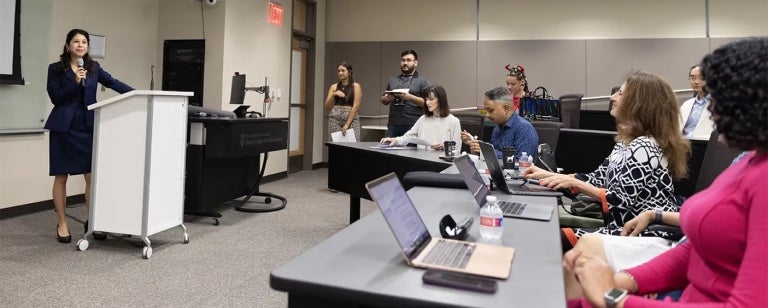
“In 2025, we are so immersed in media whether we want to be or not,” Bustamante said. “It remains important to our daily existence, so we need to become aware and better understand how media shapes our lives. We can also shape media in ways that will be positive, individually and collectively, moving forward.”
Knowledge to Build a Better Tomorrow
What distinguishes the center, though, isn’t just its global focus or ambitious research but the international teams of globally minded colleagues behind the work.
Pivotal to the center’s mission is an embrace of disparate approaches and a combination of humanistic and social science research to inspire, foster and work toward positive change locally, regionally and globally.
Doctoral candidates Silvia DalBen Furtado from Brazil and Gustavo Fuchs from Costa Rica, as well as doctoral student Alejandro Hernandez from Mexico, are just a few of the international students responsible for creating the new center’s dynamic environment, according to Bustamante.
“Those are just a few of the many students at the center who I am consistently impressed by,” Bustamante said. “Each of the international students brings their own unique set of experiences, and with that comes different perspectives, questions and knowledge that somebody from the U.S. might not have.”
DalBen-Furtado, Fuchs and Hernandez are not merely participants in the center’s work. They are leaders, bringing personal insight, linguistic diversity and fresh perspectives based on their upbringings in Belo Horizonte, Minas Gerais, and Mexico City, respectively.
A diverse group of students combined with an all-star cast of faculty and scholars round out the center, Hernandez noted.
“It makes the center more complete in terms of what we can produce. Wisdom becomes stale if drawn from only one source; it doesn’t grow,” Hernandez said. “I think the center does a really good job at drawing wisdom from different places. We have the ability to prompt ChatGPT in Bengali, Portuguese or Spanish, for example, rather than being limited to English. We can read, translate and understand papers or reports from all of these countries. That makes the work faster.”
Generational Gaps in Communication
Hernandez graduated from UT in 2023 with his master’s in global policy studies from the LBJ School of Public Affairs, specializing in policy communication and youth engagement. He also earned the LIFT Fellowship from the McCombs School of Business.
For his post-completion Optional Practical Training, Hernandez accepted a position with the City of Austin’s public information office. Beyond his work on water conservation initiatives, Hernandez identified a glaring need for improved communication channels.
“I realized that we are not communicating with my generation, Gen Z,” Hernandez said. “I had a really good team, but many of our digital components, including numerous outdated webpages, were launched or last updated the year I was born.”
Hernandez used this experience as an opportunity to bring light to this generational divide in information consumption habits.
“The LBJ School gave me the tools to work through these kinds of challenges, thanks to courses on policy and psychology,” Hernandez said. “I'm still very interested in finding out what works and what doesn't, regarding communicating policy.”
With an expanded interest in and appreciation for media and journalism, Hernandez decided to return to the Forty Acres for the journalism school’s doctoral program.
“After taking more media classes, I started to see the role that media plays in the way we communicate policies,” Hernandez said. “I got to see the way people perceive topics and understand that the way people get informed has a real impact on what they decide.”
Hernandez took his own experience and education as an example, which taught him that an effective method of communicating policy is to leverage it as an opportunity or preventative measure to avoid falling behind.
“That’s an interesting psychological tool, but it also works wonders in policy and media communications,” Hernandez said. “Then you learn to call it not ‘environmentalism’ but ‘conservation’ when you’re talking to people on the political right.”
He added, “It’s a subtle change, but 'environmentalism' got pasted with the political left. As for 'conservation,' it ties back to conserving the land and appeals more to the political right. These things blow my mind, but they matter, and they work.”
Hernandez’s next research project idea presented itself on a drive to Port Aransas with his girlfriend. He remembers being struck by the number of wind turbines peppered throughout southeast Texas.
“As a state, there is a large representation of climate skeptics, so when I saw tons and tons of wind turbines, I couldn’t help but wonder how they got there,” Hernandez said. “And how was it originally presented or communicated in rural areas?”
Hernandez became interested in the psychology behind these communication methods and found routes to apply the same logic to his background in water conservation. His current project, “Meaningful Action,” reflects that commitment to tailoring communication strategies for unique audiences, especially around climate change. This meant welcoming nuance and understanding the full range of positions on the subject.
“We tend to treat people who are concerned about climate in the same block, and the same goes for climate skeptics,” Hernandez said. “In reality, there are also doomists, optimists, the ones who seek practicality, others who seek a climate overhaul — within each of those groups are people who are unhappy with the solutions being provided.”
That’s why Hernandez is taking the “one step at a time” approach with his research.
“It's such a big problem that we really need to be working toward making small steps with everyone,” Hernandez said. "This is kind of like the goal of this research.”
Debiasing AI
For Silvia DalBen Furtado, the guidepost for her academic and professional careers stands at the intersection of global media, technology and artificial intelligence.
She graduated from the Federal University of Minas Gerais (UFMG) in 2008 with a degree in journalism, radio and television. She spent more than 10 years at D2R Studios as an executive producer of films, videos, games, apps and new media, and also worked as a reporter and editor for four years in Belo Horizonte, Brazil.
During her experience working in a newsroom, DalBen-Furtado rekindled her interest in the technological advancements at the time. She followed her passion in 2016, re-enrolling at UFMG, where she graduated with a master’s in communication.
“Having researched AI and journalism since 2013, I still recall that a number of the case studies from my master’s program were about companies utilizing cutting-edge technology in the United States,” DalBen-Furtado said. “This is what initially opened me up to potentially pursuing a doctoral degree in the U.S.”
After meeting Dr. Rosental Alves, founder and director of the Knight Center for Journalism, at a journalism conference in Brazil, DalBen-Furtado says her decision to come to the Forty Acres wasn’t a difficult one.
She arrived on campus with a sustained interest in the global landscape of technology in media, media imperialism and the asymmetries in AI.
“It worked out perfectly because Celeste opened a graduate research assistantship shortly after I arrived, which allowed me to research biases and stereotypes within AI,” DalBen-Furtado said. “For a project, we generated 2,000 AI images with Copilot [representing people from] countries across Latin America.”
She added, “At first glance, many of these images look great, but we noticed a tendency it had to produce images of people with lighter skin tones and homogenized representation, which makes up this algorithmic monoculture.”
If left unaddressed, DalBen-Furtado noted, these kinds of patterns will further reinforce stereotypes, which is why it is crucial to diversify training data.
“Reinforcing colonial perspectives, stereotypes or social biases creates room for discrimination and marginalizes those outside of consideration,” DalBen-Furtado said. “We are now going forward in a second round of research to evaluate generative AI images across the 20 most populous cities in the world.”
DalBen-Furtado is additionally involved in Bustamante’s follow-up research on exiled journalists in Costa Rica, a nation that has historically welcomed journalists from countries all over Latin America. Fuchs, who is from the country, is also on the team and serves as a tremendous resource.
After surveying 220 journalists in Costa Rica, Bustamante and her research team found that, despite the country’s reputation for press freedom and high ranking on the Reporters Without Borders World Press Freedom Index, communications professionals there are beginning to face increasingly difficult conditions.
Collaborating for Transformation
By the end of this year, DalBen-Furtado will also be a published author. During her time at UT Austin, she has collaborated on a four-year project with Joseph Straubhaar, the Amon G. Carter Centennial Professor of Communications in the Department of Journalism and Media Studies. Their collaboration will culminate in the publication of “Transnational Streaming Television: Transforming the Relations of Global Companies, Nations, Culture, and Power.”
“It has been a privilege to know and work with the three professors who have been key in my time at UT Austin: Dr. Rosental Alves, Dr. Bustamante and Dr. Straubhaar,” DalBen-Furtado said. “They have all been so generous with their time. Collaborating with these three professors and my colleagues in the center is something I will carry with me beyond my time at UT.”

